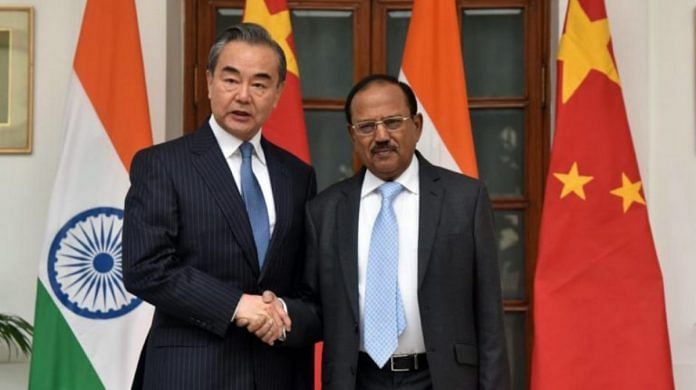Beijing: China on Monday said Foreign Minister Wang Yi and India’s National Security Advisor Ajit Doval reached “positive common understandings” over easing the current border situation and underlined the need to act promptly on the consensus reached by their military commanders to complete the disengagement of the front-line troops at the LAC as soon as possible.
On the evening of July 5, the Chinese Special Representative of the China-India Boundary Question, State Councillor and Foreign Minister Wang spoke on the phone with the Indian Special Representative and National Security Advisor Doval, a press release issued by the Chinese Foreign Ministry said.
Both sides had candid and in-depth discussions over easing the current border situation and reached positive common understandings, it said.
Both sides welcomed the progress achieved in the recent military and diplomatic meetings, agreed to stay in dialogue and consultation, and stressed the importance to promptly act on the consensus reached in the commander-level talks between Chinese and Indian border troops, and complete disengagement of the front-line troops as soon as possible,” it said.
The troops of India and China are locked in an eight-week standoff in several areas in eastern Ladakh including Pangong Tso, Galwan Valley and Gogra Hot Spring. The Chinese military on Monday began withdrawing troops from the Galwan Valley and Gogra Hot Spring.
Both sides agreed to follow the important consensus reached by leaders of the two countries. Both believed that maintaining peace and tranquillity in the border areas matters significantly to the long-term development of bilateral relationship, that the boundary question should be placed properly in the bilateral relations, and that an escalation from differences to disputes should be avoided, the Chinese press release said.
Both sides reiterated adherence to the agreements signed by the two countries and making joint efforts to ease the situation in the border areas, it said.
During his talks with Doval, Wang stressed that both sides should pay great attention to the current complex situation facing China-India bilateral relations, and work together to “overcome and turn it around as soon as possible, the press release said.
Wang hoped that the two countries can work together to guide public opinion in the right direction and advance bilateral exchanges and cooperation.
He noted that this year marks the 70th anniversary of the establishment of diplomatic ties between China and India.
“Our bilateral relations have withstood tests and made hard-won progress. The right and wrong of what recently happened at the Galwan Valley in the western sector of the China-India boundary is very clear. China will continue firmly safeguarding our territorial sovereignty as well as peace and tranquillity in the border areas, the statement quoted Wang as saying.
India has made it clear to Beijing that the Chinese side took “pre-meditated and planned action” that was directly responsible for the resulting violence and casualties.
“It reflected an intent to change the facts on ground in violation of all our agreements to not change the status quo,” External Affairs Minister S Jaishankar told Wang during their phone conversation on June 17.
The Chinese press release said that Wang emphasised that said for both China and India, achieving development and revitalisation is the top priority where the two countries share long-term strategic interests.
“Both sides should adhere to the strategic assessment that instead of posing threats, the two countries provide each other with development opportunities,” the Chinese foreign minister said.
On June 30, the Indian and Chinese armies held the third round of Lt General-level talks during which both sides agreed on an “expeditious, phased and step wise” de-escalation as a “priority” to end the standoff.
The first round of the Lt General talks were held on June 6 during which both sides finalised an agreement to disengage gradually from all the standoff points beginning with the Galwan Valley.
However, the situation deteriorated following the Galwan Valley clashes that left 20 Indian Army personnel dead as the two sides significantly bolstered their deployments in most areas along the LAC.
Also read: Ajit Doval talks to Chinese foreign minister, both agree on ‘earliest complete disengagement’



